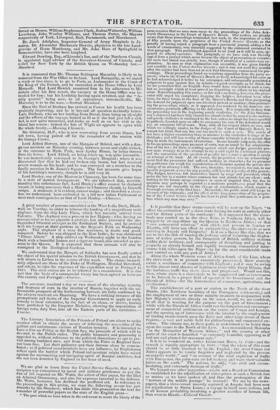Is it possible that three steam-vessels will be sent up
the Niger, "to effect the extinction " of a slave-trade having its seats at entirely other and liar distant parts of the continent ? is it supposed that the slave- trade now carried on in the river Zaire, in Southern Africa, will be stopped by an expedition up time Quorra in Northern Africa ; or that " mice commercial relations" with chiefs and powers in Soudan or Nigritia, will have any effect in extinguishing the slave-trade as now existing in Angola and Benguela? Is it on a theory like this, that we are to rim the risk of rousing the jealousy and of incurring the displea- sure of native powers, by the formation of British military stations within their territory, and consequently of disturbing and putting in jeopardy an already formed and rapidly increasing commercial inter- course with tribes upon time Niger—by far the most considerable trade now carried on with any part of Africa ?
Along the whole Western coast of Africa South of time Line, where time slave-trade is at present extensively prosecuted, there scarcely exists a semblance of commerce with England ; and it may lie owing to this almost total absence of legitimate trade will' Great Britain, that the barbarous traffie. has th:re risen and progressed. Wouid not this, then, where there is a slave-trade to be suppressed and an intercourse to be formed, he a proper field of operation for Government and the friends of Africa—for the introduction of commerce, agriculture, and civilization ?
The establishment of a port or station to the North of the river Dande, (the Northern boundary of time Portuguese settlements,) and the employment of two or three suitable steamers in conjunction with her Majesty's cruisers already on the coast, would, we are confident, be all that is wanting for the purpose on the part of Government ; while with the friends of Africa would rest the formation and encourage- ment of commercial settlements on the coasts of Congo and Loango, and the opening up of intercourse with the interior by the employment of trading steam-vessels upon the Zaire and other large rivers of these regions,—a vast and noble field for philanthropic and commercial ex- ertion. The climate too, in these parts, is understood to be better than upon time coasts to the North of the Line. Alums considered Malemba. "as the Montpelier of Western Africa ;" and the country at other parts of the coast is described " as extremely beautiful, appearing as if laid out and planted for ornament only."
It is to be wondered at, writes Lieutenant Bonn, in 1822—and the remark is equally appropriate in 18-10—" that the whole of this coast should be so little resorted to by the English : the river Congo (or Zaire) appears to be totally forgotten and neglected by the present mercantile world :" and "on account of the total explosion of traffic with Europeans, the palm-nuts are left to decay and waste their valuable juices on the earth." The natives, he adds, "are civil and accom- modating, and extremely desirous of traffic." We hazard one other suggestion—might not a Board or Commission be established for the adjudication of slave-prizes at such a British fort or station as we have spoken of, and thus the prolongation of the "horrors of the middle passage" be averted ? We see by the news- papers, that a slave-vessel recently captured at Angola had been sent for adjudication to Sierra Leone ; a voyage in itself more tedious, and in all human probability involving a greater sacrifice of human life, than even to Brazil.—Cu!onial Gazette.


























 Previous page
Previous page